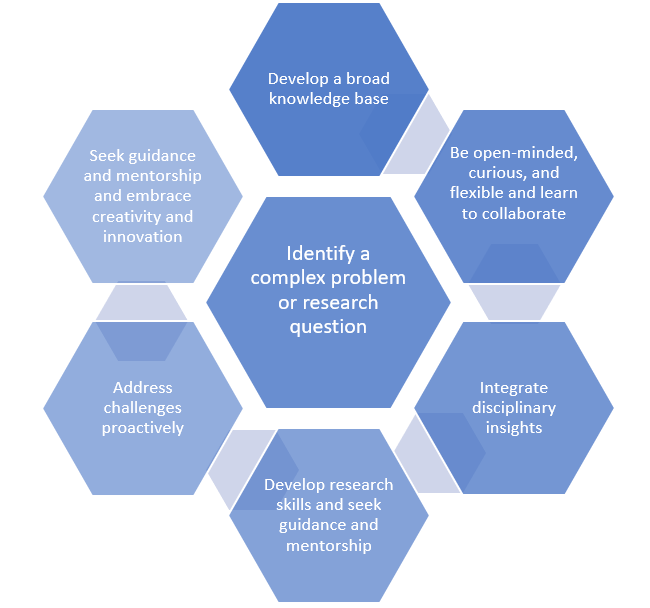23 Engaging the Interdisciplinary Research Process
Rhonda D. Davis
Engaging in interdisciplinary research involves combining knowledge, methods, and perspectives from multiple academic disciplines to address complex problems or questions. Here’s one way to approach it:

Identify a complex problem or research question
Start by selecting a topic or issue that cannot be fully addressed by a single discipline. This could be a societal challenge, an environmental problem, or a multifaceted research question.
Develop a broad knowledge base
Familiarize yourself with the basics of relevant disciplines. This doesn’t mean becoming an expert in each field, but rather understanding key concepts, methodologies, and perspectives.
Learn to collaborate
Interdisciplinary research often involves working with others from different academic backgrounds. Practice effective communication, active listening, and respect for diverse viewpoints.
Integrate disciplinary insights
Look for connections, overlaps, and complementary ideas between disciplines. The goal is to synthesize knowledge and methods to create a more comprehensive understanding of your complex problem(s).
Develop research skills
Learn various research methodologies and tools used across disciplines. This might include qualitative and quantitative methods, data analysis techniques, or specialized software.
Be open-minded, curious, and flexible
Interdisciplinary research often requires adapting to new ideas and approaches. Be willing to step out of your comfort zone and explore unfamiliar territory. Acknowledge your bias when studying complex problems.
Address challenges proactively
Recognize that interdisciplinary work may face unique challenges, such as attitudinal barriers, communication difficulties, lack of shared knowledge resources, lack of prior interdisciplinary experience, and more. Plan accordingly and be prepared to overcome these obstacles.
Seek guidance and mentorship
Utilize resources available at your institution, such as the library or faculty members experienced in cross-disciplinary work.
Practice critical thinking
Develop the ability to analyze and evaluate information from multiple perspectives. This skill is crucial for synthesizing diverse disciplinary insights and better understanding complex problems.
Embrace creativity and innovation
Interdisciplinary research often leads to novel solutions and insights. Don’t be afraid to think outside the box and propose unconventional approaches.
By following these steps, you can begin to develop the skills and mindset necessary for successful interdisciplinary research. Remember that this approach requires patience, curiosity, and a willingness to learn from others. As you progress, you’ll find that interdisciplinary research can lead to exciting discoveries and a more holistic understanding of complex issues.